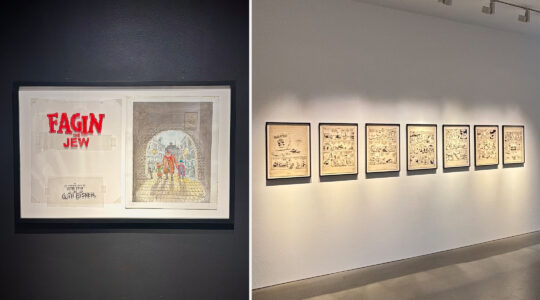The first voice heard in Ira Fuchs’ new play “Vilna,” opening next week Off Broadway, is that of a ghost.
“I was the last person alive who knew firsthand what happened in the forest of Ponar, just outside of Vilna,” says Tony Award-nominee Mark Jacoby, in the voice of the late Motke Zeidel, born in Vilna in 1925. Zeidel, who died in 2007, was one of a group of Jewish prisoners who plotted and carried out one of the great escapes of the Holocaust.
The play, written and produced by Fuchs and directed by Joseph Discher, is historical fiction, based on real events and figures, like Zeidel, resistance leader Abba Kovner and Chayele Rosenthal, a singer who performed in ghetto cabaret shows.
The Jewish Week caught up with Fuchs during dress rehearsals at The Theatre at St. Clement’s, with strains of a Polish song in the background. Fuchs, 67, dressed in a turtleneck and corduroy jacket, explained that representatives from Actor’s Equity were present to make sure that scenes containing violence are safe for the actors.
At Queens College in the early 1970s, Fuchs studied English and began writing plays; at 21 he had plays produced at Playwright’s Horizon. At the same time, he got a job in the newly emerging computer industry, and then spent the next 45 years as an entrepreneur involved in computer technology and wrote two books in that field.
In 2016, Fuchs had the opportunity to return to his passion for writing plays — as he always knew he would — in a workshop at Hollins University. For an assignment to base a play on a newspaper article, he chose a New York Times piece about the discovery by archaeologists and mapmakers of the location of an escape tunnel dug by hand by Jewish prisoners in Ponar, Lithuania, outside of Vilna (now Vilnius). Ponar is the site of brutal mass shootings and mass burial pits. In 1943, the Nazis were in fear of the approaching Russian army, so they had Jewish prisoners dig up and then burn the bodies; the Jewish prisoners knew they would be killed too when they finished their work, so they devised an escape plan. Of the 80 who attempted the escape, 12 were successful and 11 survived the war.
The play imagines what happened before.
“Vilna” unfolds the story of Zeidel and his friend Yudi Farber in Vilna in the years before World War II. Farber, a young civil engineer, had a key role in designing as well as digging — with spoons — the tunnel. It’s a story of risking lives to save others and making painful decisions. Fuchs said that the play is filled with drama, hangings and dancing. He sees the characters as heroes, noting, “Being a hero is not always about picking up a gun.”
Fuchs was drawn to the city of Vilna for its role as a center of Jewish learning and culture, and its densely Jewish population before the war. He did extensive research, unfazed by all that has been written in so many formats about the Holocaust.
“Being a Jew is like gravity. It always pulls you back,” one of the characters, Rabbi Halpern, says in the play. He could be speaking for the playwright, who said, “Identity is so deep, there’s no escaping.” He adds, “Faith is a gift. I don’t have that. I wouldn’t mind it.”
For Fuchs, “Theater is the most efficient proxy for conveying the intellectual and emotional incomprehensibility of the Holocaust and making it abhorrently tangible again.”
“Vilna” runs from March 12 to April 14 at The Theatre at St. Clement’s, 423 W. 46th St., telecharge.com.
The New York Jewish Week brings you the stories behind the headlines, keeping you connected to Jewish life in New York. Help sustain the reporting you trust by donating today.




